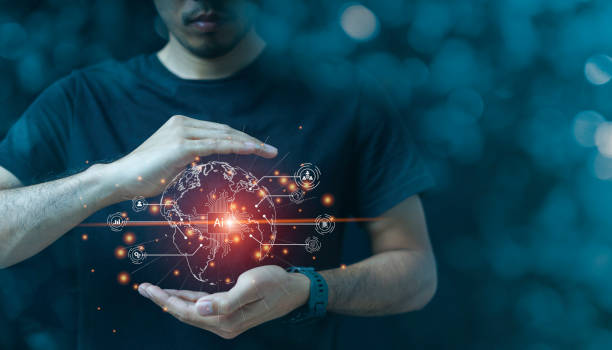
Artificial intelligence (AI) and automation are rapidly transforming the digital marketing landscape. These technologies are enabling businesses to improve efficiency, personalize campaigns, and make data-driven decisions, ultimately leading to increased ROI. However, as with any major technological shift, there are also challenges and limitations that need to be addressed. In this blog post, we will explore the advantages, challenges, and future trends of AI and automation in digital marketing.
Advantages of AI and Automation in Digital Marketing
One of the main advantages of AI and automation in digital marketing is increased efficiency and productivity. Automation tools can handle repetitive tasks, such as data entry and analysis, freeing up marketers to focus on more strategic and creative work. Additionally, AI-powered algorithms can analyze vast amounts of data in real-time, allowing businesses to identify patterns and insights that would otherwise be invisible to human analysts.
Another advantage is improved targeting and personalization. AI-powered technologies can analyze customer behavior and preferences, allowing businesses to deliver highly-targeted and personalized messages to their audience. This can lead to higher conversion rates and customer satisfaction.
Additionally, AI and automation can enhance data analysis and decision making. With the ability to process large data sets quickly, AI can identify patterns, trends, and insights that can be used to optimize marketing campaigns and inform business decisions.
Finally, automation can lead to reduced costs and increased ROI. By automating repetitive tasks, businesses can reduce labor costs and increase productivity. Additionally, AI-powered technologies can help identify and eliminate inefficiencies in marketing campaigns, leading to increased ROI.
Challenges and Limitations of AI and Automation in Digital Marketing
While AI and automation have many advantages, there are also challenges and limitations that need to be considered. One of the main challenges is a lack of transparency and accountability. Because AI-powered systems make decisions based on complex algorithms, it can be difficult to understand how and why they arrived at a particular conclusion. This can make it difficult to hold the technology accountable if something goes wrong.
Another challenge is dependence on data quality and availability. For AI to be effective, it needs access to large amounts of high-quality data. If the data is inaccurate or incomplete, the AI-powered system will produce inaccurate results.
Moreover, ethical concerns and privacy issues are arising with the increasing use of AI and automation. With the use of personal data and profiling, there is a risk of data breaches, misuse of data, and violation of user privacy.
Finally, implementing and using AI and automation requires specialized skills and knowledge. Businesses need to invest in the appropriate technology and hire employees with the necessary skills and expertise to use it effectively.
Impact on Job Market and Career Opportunities
AI and automation are also having a significant impact on the job market and career opportunities. With the increasing use of automation, certain tasks and roles are becoming obsolete, leading to job displacement. On the other hand, businesses are also creating new job roles and responsibilities that focus on data-driven and technology-focused positions.
As a result, there is a growing demand for professionals with specialized skills and knowledge in AI and automation. This includes data scientists, machine learning engineers, and AI-focused marketers.
Future Trends and Predictions
The future of AI and automation in digital marketing is bright. As the technology continues to evolve and improve, we can expect to see greater integration of AI and automation in various aspects of digital marketing.
One of the key trends is the increasing use of AI-powered chatbots and virtual assistants. These technologies can help businesses provide 24/7 customer service and support,

Businesses provide instant customer support and improve customer engagement. Additionally, we can expect to see more advanced AI-powered technologies, such as natural language processing and machine learning, being used to create more personalized and engaging marketing campaigns.
Another trend is the use of AI in programmatic advertising. Programmatic advertising uses AI-powered algorithms to automatically buy and place ads on different platforms, allowing businesses to reach their target audience more effectively.
Finally, AI and automation have the potential to transform the entire marketing industry. By automating repetitive and time-consuming tasks, businesses can focus on more strategic and creative work. Additionally, AI-powered technologies can help businesses make data-driven decisions, leading to more effective and efficient marketing campaigns.
Conclusion
AI and automation are rapidly transforming the digital marketing landscape, providing businesses with new opportunities to improve efficiency, personalization, and ROI. However, businesses need to be aware of the challenges and limitations of the technology and make sure they have the necessary skills and expertise to use it effectively. As the technology continues to evolve, we can expect to see more advanced AI-powered technologies and greater integration of AI and automation in various aspects of digital marketing. It’s important for businesses and marketers to stay up-to-date on these trends and adapt accordingly to stay competitive in the market.
“Want to take your small business’s digital marketing to the next level? Contact us today to learn more about our comprehensive digital marketing services, including SEO optimization, social media management, email marketing, and more. Our team of experts will work with you to create a customized strategy that fits your unique business needs and goals. Don’t wait any longer to improve your online visibility and drive more traffic to your website. Contact us today to schedule a consultation!”
Book a call from Webgrantor –




